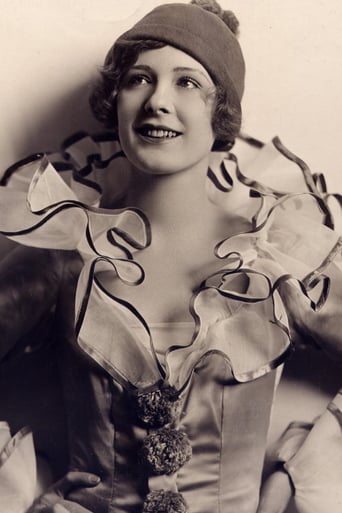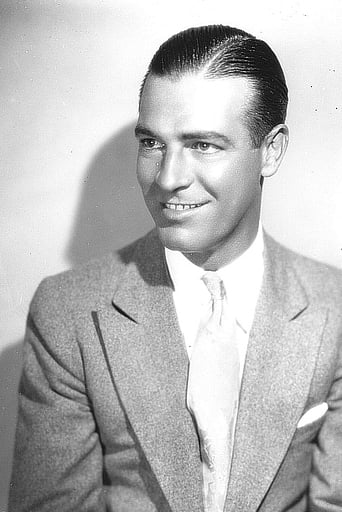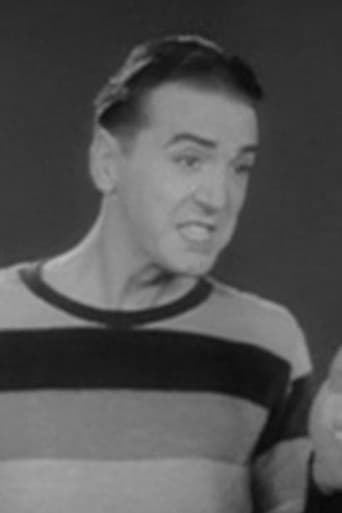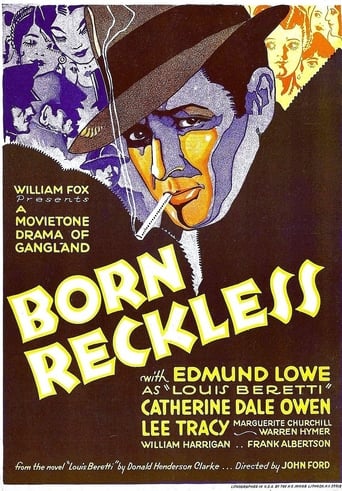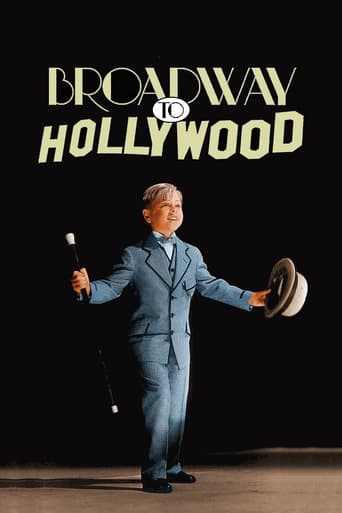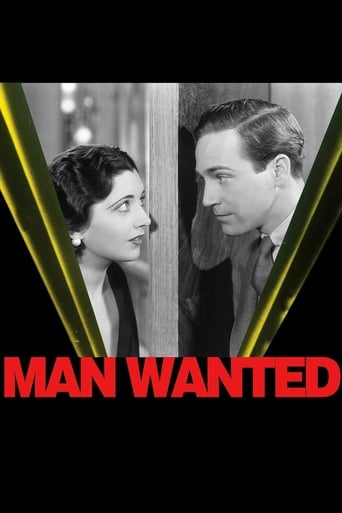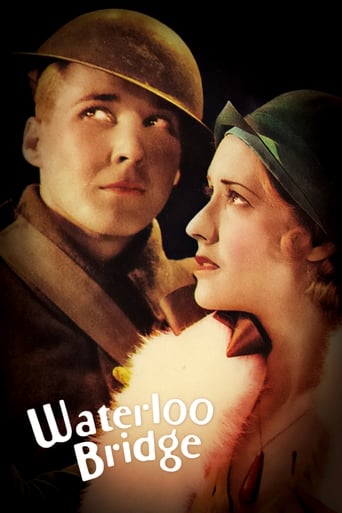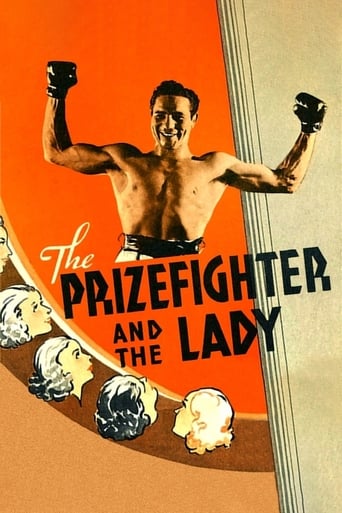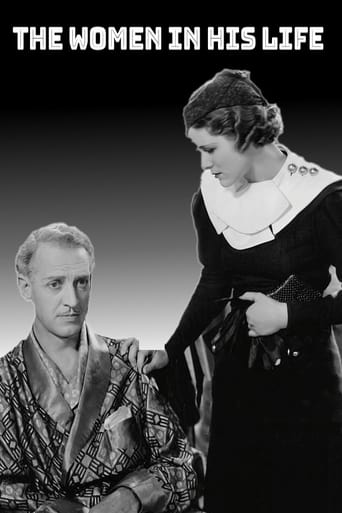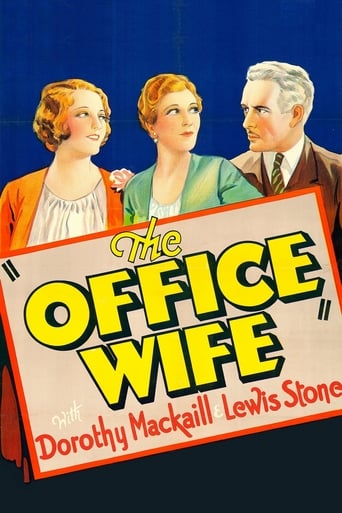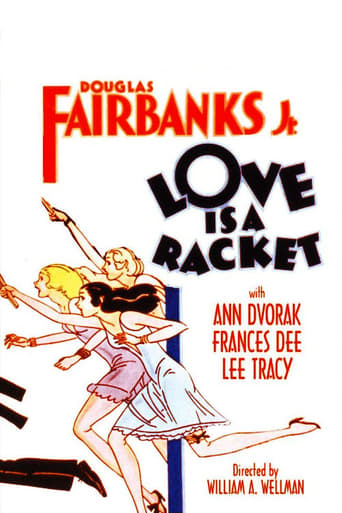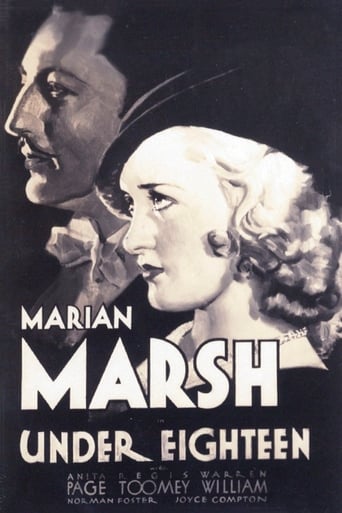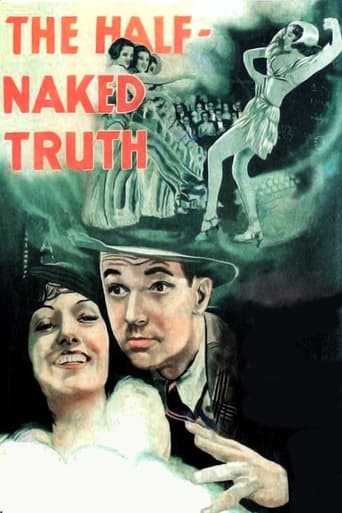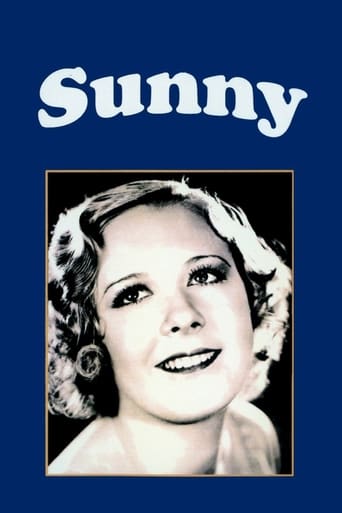
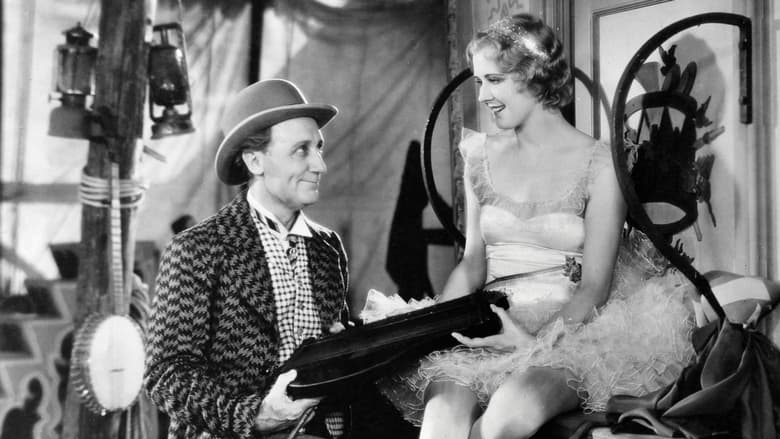
Sunny (1930)
A showgirl falls for a society boy but has to win over his family.
Watch Trailer
Cast
Similar titles
Reviews
It’s not bad or unwatchable but despite the amplitude of the spectacle, the end result is underwhelming.
Strong acting helps the film overcome an uncertain premise and create characters that hold our attention absolutely.
By the time the dramatic fireworks start popping off, each one feels earned.
An old-fashioned movie made with new-fashioned finesse.
Sunny (1930) ** (out of 4) The second of three pictures that Broadway star Marilyn Miller would make at First National. This one here has her playing Sunny, a girl working at a circus who sneaks on a boat heading for America so that she can find a better life. Along the way she ends up marrying Tom (Lawrence Gray) but their hopes for a good future are challenged. SUNNY isn't nearly as good as Miller's previous film (SALLY) but fans of the actress will probably still want to watch it and especially when you considering how few movies she made due to her early death. The biggest problem with this film is actually the sound quality. I'm really not sure what happened during the making of this movie but the sound quality is downright awful from start to finish. It doesn't seem to be an issue with the discs today because if it was the case of a movie just having a poor soundtrack then it would be uneven from reel to reel. This film sounds the same from start to finish so this leads me to believe it was something done during production. Every time someone talks it's as if they're standing in a cave to where we get an echo as well as some hiss. This is annoying at first but overtime you just get used to it. Miller is without question the real reason to watch this film as she has a certain charm and energy that was made for the big screen. Gray, on the other hand, comes across pretty bland and boring as does the majority of the supporting cast, although BRIDE OF FRANKENSTEIN fans will get a look at O.P. Heggie in a role here. SUNNY also features some rather mediocre music and songs, which certainly doesn't help matters.
This is the closest we'll ever get to seeing the wonderful Marilyn Miller on stage in her role as Sunny. The title song and the memorable "Who" were some of the most popular tunes in the late '20s, as played by George Olsen and His Music (who not only played in the Broadway production but cut a record with those songs on it.) It's rather interesting that WB made this movie right at the end of the musical era: had the stock market crash happened two years later, this might well have been an color production. It was certainly intended to be a blockbuster, and if only for that reason it's worth watching -- to see what constituted "popular" in a different era.
SUNNY (First National, 1930), directed by William A. Seiter, stars the legendary Marilyn Miller (1898-1936) in her second screen appearance following her motion picture debut as SALLY (1929). Along with SALLY, SUNNY is a reworking of a Broadway play starring Miller which unfortunately did not acquire the same care and production values as her preceding film. Released at the time when musicals were on the wane, SUNNY eliminated most of the original score, leaving much of it, including the title tune, to background music. With a handful of Broadway to Hollywood musicals produced during the early sound era (1929-30), consisting of romantic lovers, secondary "comedy relief" couple, society and character types, situations and misunderstandings leading to song interludes for moderate entertainment, SUNNY is basically more of the same, yet tolerable.Miller plays Sunny Peters, a bareback rider of the Royal Continental Circus in Southampton, England, where "Wendell Wendell's circus was not so good, but loud." An hour before sailing for New York, Tom Warren (Lawrence Gray), an old acquaintance of Sunny during the war, pays her a visit. While Sunny still admires Tom, he's now engaged to débutante Margaret Manners (Barbara Bedford). Sunny's father (O.P. Heggie) has already arranged for her to marry Harold Harcourt Wendall-Wendall (McKenzie Ward), a "fish" whom she doesn't love. In order to keep from marrying Wendall, Sunny, disguised in boys attire, breaks away from the circus and heads over to the dock where she sneaks on board ship that's "five seasick days from New York," taking refuge in the cabin of Tom's pal, Jim Denning (Joe Donahue). Discovered a stowaway, passengers agree to help pay her passage and new wardrobe. As for Sunny's father, who had come to find Sally, has accidentally made his way on board while "waiting for the lady with the money for the dog," and is forced to pay his passage by scrubbing the deck. Because Sunny has no passport and to be sent back after the ship docks, she manages to remain in the states by marrying Jim, with the agreement of divorcing him after-wards so he can be free to wed the love of his life, Weenie (Inez Courtney). For their wedding present, "Jim gets his gym while Sunny's idea was to get rid of her Jim." After Sunny takes part in a society fox hunt at the Pine Crest estate, situations become more complex between her and Tom.While SUNNY originally included the popular songs originated from the Broadway production, what survives in this screen adaptation, by Otto Harbach, Oscar Hammerstein II and Jerome Kern, are as follows: "Oh, Did He Ramble" (sung by Lawrence Gray and friends); "Who?" (sung by Marilyn Miller and Lawrence Gray); "I Was Alone" (sung by Marilyn Miller, reprized and danced by Miller); "When We Get Our Divorce" (instrumental dance by Miller and Joe Donahue); and "The Hunt Dance" (instrumental dance by Miller). Aside from title song not existing in final print, "Do Ya Love Me" (performed by Joe Donahue and Inez Courtney), sometimes credited as part of the movie, is not presented in available prints.SUNNY shows off its theatrical origins with its song numbers, especially during the lively dance sequence of "I Was Alone" where Miller takes center stage tap dancing while the boat passengers observe facing the camera watching her from the back. There are some great moments of comedy, however, especially one gag resembling an latter day Abbott and Costello routine, and another, during a wedding sequence reworked again in MGM's LIBELED LADY (1936) where bride gives a much passionate kiss to the best man instead of the groom.With Marilyn Miller as the main attraction, the supporting players consists of those whose names and personalities are both unfamiliar and lacking film chemistry. One cannot help feeling that the comedic character of Jim Denning, played by the tall Joe Donahue, talking like Ross Alexander with mannerisms of Ray Bolger, might have been more substantial as the leading man instead of Gray, leaving the comedy relief part to Joe E. Brown instead. McKenzie Ward, as Wendall-Wendall, the rejected suitor, lacks originality performing his Claude Allister manner. O.P. Heggie role comes across as something more to the liking of W.C. Fields, considering that as a circus man with a weakness for drinking, but since Heggie's role is limited, it's just as well that Fields didn't assume the part anyway. Fields would enact the role as Miller's father in her final screen performance of HER MAJESTY, LOVE (1931).SUNNY did acquire a 1941 remake for RKO Radio starring Anna Neagle, Ray Bolger, John Carroll and Edward Everett Horton, where much of the original score, including the title tune, were retained. While it musically improves over the original, both screen versions are forgotten and seldom revived.Available for viewing on Turner Classic Movies, the original 77 minute version of SUNNY, suffers from poor audio and slightly faded visuals which calls for restoration process. Other than that, it's a sort of early film musical nice to have around since it consists Marilyn Miller in the role she made famous on the Great White Way.(**).
I have only recently been able to catch up with the films of Marilyn Miller since they are not shown on TCM in the UK.I have been much intrigued over the years because this was one of the superstars of the 20s.What was she really like.To some stars of this era like Jolson some of the magic still shines through,but alas not for Miller.Her dancing seems awkward and poorly choreographed,her singing somewhat limited and as an actress she makes Ruby Keeler seem like Hepburn.Even worse in this film as the public had grown tired of musicals virtually all of the musical numbers have been deleted.So we are left with a comedy of that period with little real appeal.She was being paid $500000 for this!So i have only two conclusion.Either she was poorly served by the cinema or she had no talent at all.I think that the truth is nearer the later than the former.
